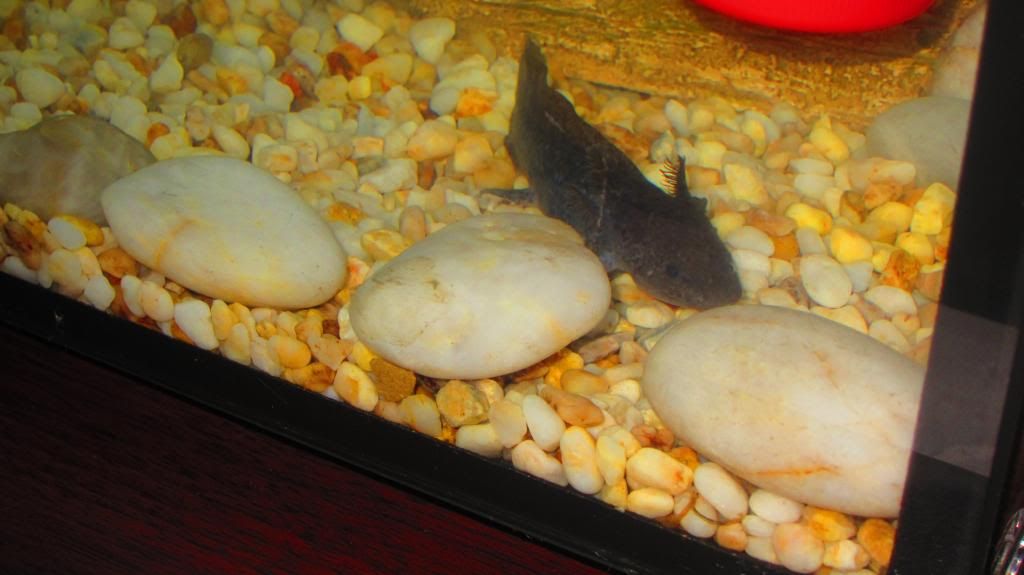So basically I got given a tank and Axolotl baby a few days later as a gift recently. I set up the tank, put water conditioner in, rinsed and washed everything and bought all the essentials etc. I was expecting to receive the Axolotl two weeks minimum after this, but due To unforeseen circumstances I received him two days after my tank was set up.
I've been really worried about the little guy. To my knowledge, if a fish or amphibian is put in a tank that has-t cycled for a month, theres A good chance they are dead.
I've been Doing every possible remedy to keep the little guy alive and although he seems really healthy and there's no problems as of yet, that whole ammonia/nitrate issue is still in the back of my head. About 2 days ago, the tank absoloutley stunk and I did a 25% water change to find no difference in the smell. I eventually ended up doing about a 75% water change and that got rid of a lot of the smell but not all of it. I've been doing 25% water changes every Day since, and purchased an air filter. Ive left the lid off for most of the days since the smell incident and the smell has pretty much disappeared. (still the faintest of smells when I put my nose right close to the water).
Basically my question is: what do I do now to ensure the little guy survives? I've read lots of different and sometimes contradicting material and it seems as though everything is based on opinion rather than concrete facts. Should I add plants to help with the ammonia problem? (assuming that's what it probably was). How about shrimp to get rid of excess food? Do I keep doing daily 25% Water changes? Maybe I should resort to some of those ammonia removers such as prime, etc.
Also a Side question, when I bought gravel for the tank at an aquarium, I asked specifically for Axolotl safe gravel or surface. The person I was dealing with knew exactly what I was talking about and what he was talking about and recommended this special gravel that will apparently not get swallowed up by the axolotl. Looking at the gravel now, I can't really see how that's the case. Most of the individual gravel pieces are about 1cm in length (some bigger, some smaller). Ideas?
I've been really worried about the little guy. To my knowledge, if a fish or amphibian is put in a tank that has-t cycled for a month, theres A good chance they are dead.
I've been Doing every possible remedy to keep the little guy alive and although he seems really healthy and there's no problems as of yet, that whole ammonia/nitrate issue is still in the back of my head. About 2 days ago, the tank absoloutley stunk and I did a 25% water change to find no difference in the smell. I eventually ended up doing about a 75% water change and that got rid of a lot of the smell but not all of it. I've been doing 25% water changes every Day since, and purchased an air filter. Ive left the lid off for most of the days since the smell incident and the smell has pretty much disappeared. (still the faintest of smells when I put my nose right close to the water).
Basically my question is: what do I do now to ensure the little guy survives? I've read lots of different and sometimes contradicting material and it seems as though everything is based on opinion rather than concrete facts. Should I add plants to help with the ammonia problem? (assuming that's what it probably was). How about shrimp to get rid of excess food? Do I keep doing daily 25% Water changes? Maybe I should resort to some of those ammonia removers such as prime, etc.
Also a Side question, when I bought gravel for the tank at an aquarium, I asked specifically for Axolotl safe gravel or surface. The person I was dealing with knew exactly what I was talking about and what he was talking about and recommended this special gravel that will apparently not get swallowed up by the axolotl. Looking at the gravel now, I can't really see how that's the case. Most of the individual gravel pieces are about 1cm in length (some bigger, some smaller). Ideas?


